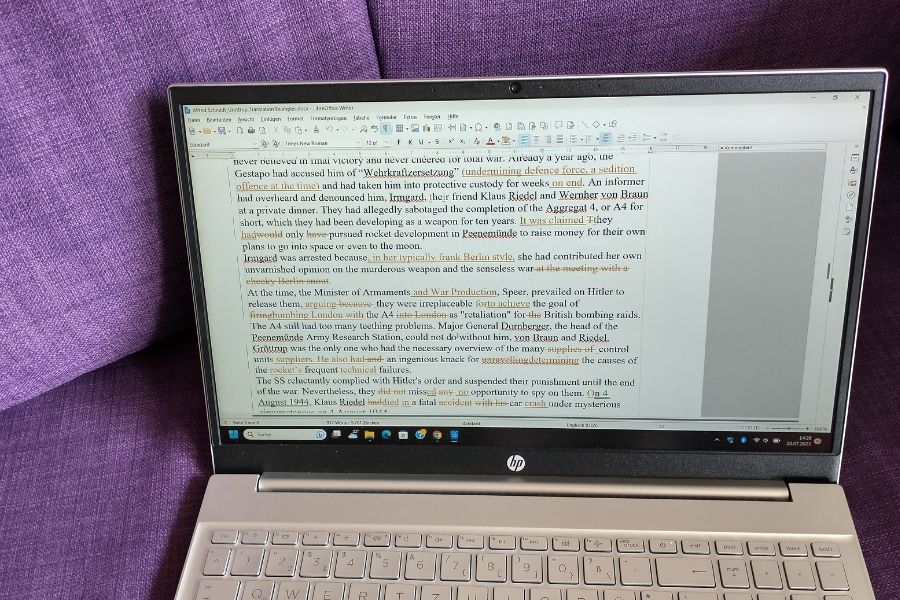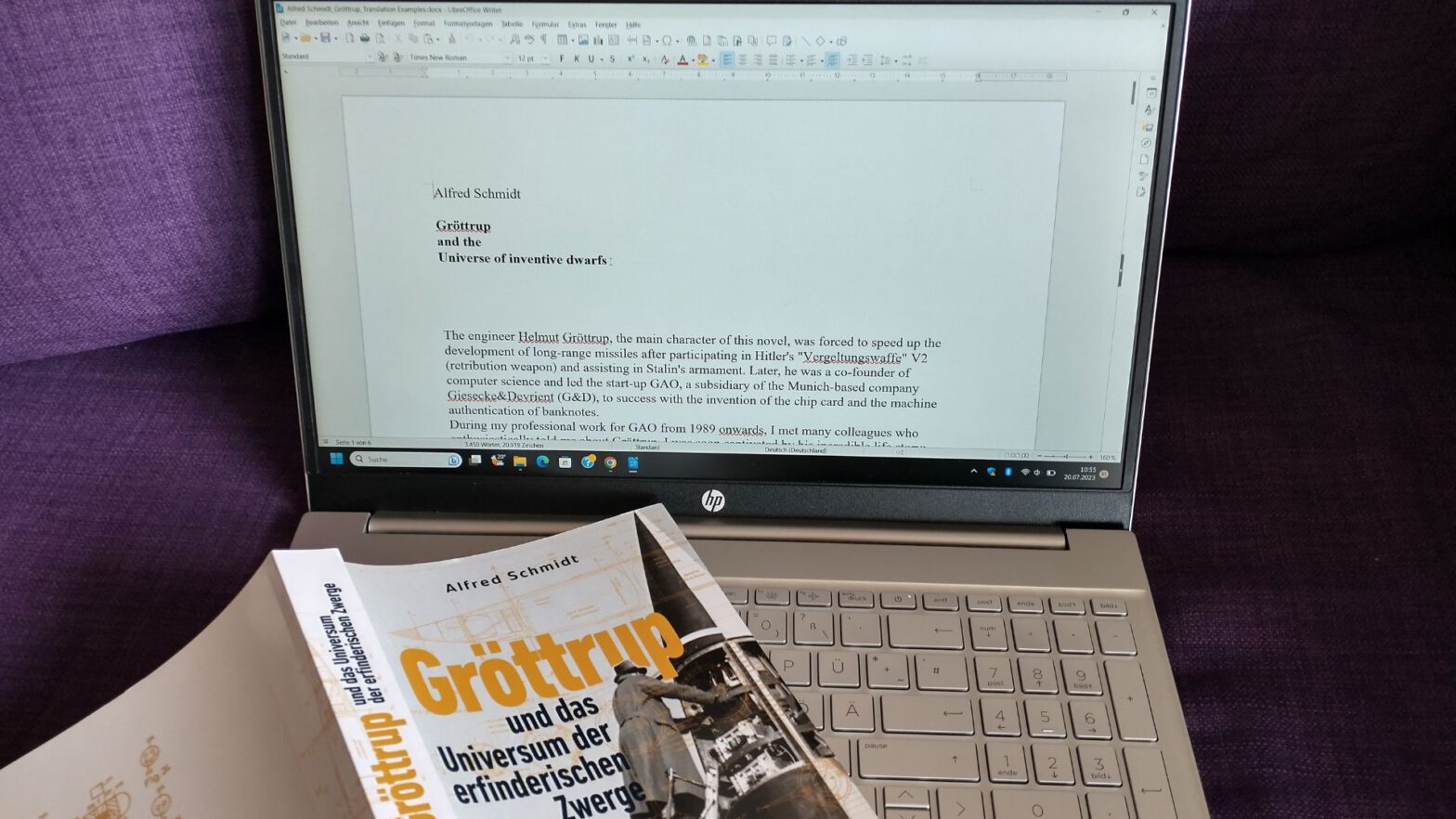Artificial Intelligence (AI) is being put to many beneficial uses, including translation. But how good are these AI-powered translations?
Among the tools available are Deepl and ChatGPT. We sometimes used Deepl at the Embassy of Canada for translations from English to French and vice versa when our in-house translators were not available. While I write English as I write German, it takes me much more time to write French. Deepl therefore was a great help and I was very positively impressed with the quality. My texts only needed minimal polishing. My personal impression was that the translations were very good, but not entirely perfect – 97%.
I recently used Deepl for two specific projects for translations from German to English. One was an organization’s website, the other was extracts from a novel.
How did that go?
Translating a Website
My friend’s employer, a small organization with almost exclusively German reach, wanted to get its German website translated into English. Theirs was a comparatively small website with only a few pages, but high-level academic content. Any translations would thus have to be very carefully done.
My friend trialed Deepl with the most complex text on the website and was impressed with the result. We thus agreed I would run the website through Deepl and check the translations, making any necessary corrections.
The actual translation was done much more quickly than a human translator would ever be able to do it – maybe a half-hour in total (including the time needed to copy and paste the original text and the result) instead of several days. No great surprise there.
The quality of the translation was very good. For the most part, I only had to make minimal edits, such as capitalization of names. The few slightly more substantial changes were due to the German original.
My verdict:
- Excellent input/ output ratio.
- Very good results for factual copy.
Translating Literary Fiction
STROUX edition, an independent publishing house in Munich, is looking to sell international licenses for foreign translations and publication of their books.
The issue here? No publisher will buy a title and commission a full translation without having read at least an excerpt. But only very few editors outside of the German-speaking area read German. Human translations are expensive, especially for a small company. STROUX edition therefore selected a few excerpts from the book, ran them through Deepl and commissioned me to review and edit the resulting translation, a total of six pages in Word.
The Book
Does your credit card have a chip? Have you ever wondered who developed the technology behind the smart card? The answer is, Helmut Gröttrup.
Gröttrup was a German engineer who worked on the Nazis‘ V2 rocket program alongside Wernher von Braun. After World War II, instead of joining von Braun in the US, he continued his work in Thuringia in the Soviet Occupied Zone. With his colleagues, he was eventually deported to the USSR, where he worked on the Soviet rocket program under Sergei Korolev.
After the family managed to return to Germany, Gröttrup eventually joined GAO, a subsidiary of Giesecke & Devrient. G&D today is best-known for printing bank notes, but at the time was a small company. Gröttrup was instrumental in developing several groundbreaking innovations, such as a machine for counting and verifying bank notes, and the smart chip technology. Incidentally, he pioneered computer sciences. He also had a colorful personal life.
This fascinating story is told in Alfred Schmidt’s book „Gröttrup und das Universum der erfinderischen Zwerge“ (2022).
My Translation Review
The book is a mixture of historical facts, techy details, and personal story. That makes it quite complex. It helped that I was familiar with the original German work, having done the final proofreading prior to publication.
My edits on this text were a lot more substantial and a lot more numerous than those on the website above.

It showed very quickly that Deepl does exactly what it promises to do: it provides a correct translation from German to English. What it does not (necessarily) do is adjust idiomatic expressions, cultural references, or complicated ways of phrasing things.
For instance, Gröttrup’s wife hailed from Berlin. Berliners are known in Germany for having a very frank style of communication, called „Berliner Schnauze“. Deepl translated this to „Berlin snout“. While the words are correct – „Schnauze“ is snout – the expression seems out of place within the phrase and probably does not make any sense to the majority of potential readers. I rephrased the sentence to provide context.
Likewise, where certain sentences in the German original were quite long-winded, Deepl provided correct translations. It did not, however, split sentences in two, or rephrase them in a way that would sound natural to a native speaker of English.
Another issue that became very clear: where a German word might have multiple meanings in English, Deepl does not necessarily pick the ideal one.
What am I trying to say with all this? The original Deepl translation would have served to transmit an idea of the story and the book’s content, but it would not have felt very smooth to read.
Since fiction is very much about how a book sounds, this somewhat „bumpy“ translation might well have put off editors. The book’s author, an engineer himself, has a very German and „engineer-y“ way of writing that would probably be substantially adjusted in any foreign translation. A human was and will be needed to edit the text so it would not sound like a collection of oddly-phrased sentences.
Conclusion
Deepl did a very good job of translating from German to English in my two case studies. But that’s where it stopped. It is a translator, not an editor. Especially not an intercultural editor.
The novel’s excerpts needed substantial editing to produce a text that sounds natural to native speakers of English. Deepl was a great support in the entire process, delivering a first draft at very high speed. This allowed me to focus on the editing process rather than worry about any mistakes in the translation.
Based on my experience, Deepl is best for:
- Text that is factual and written in a sober style, devoid of emotion
- Shorter sentences that are not too complex
- A topic that is not very complex or „exotic“, i.e., for which it may have received training data
For other types of text such as prose, substantial editing might be needed to convey more than just the words‘ pure meaning. I would always recommend a review of AI-powered translations by a native speaker, but especially so where the purpose of a text is not just to convey facts.
However, the tool holds one probably unintended benefit: „bumpy“ translations can point out to the author where they might want to revise their original text to make it clearer and more specific.
There is also a German version of this article – written by me, not translated by AI.
Bonus: Deepl vs. ChatGPT Direct Comparison
STROUX edition kindly provided a testimonial for me based on my work described above. I decided to feed the unedited German original into Deepl and ChatGPT and to compare the resulting English translations.
In its free version, Deepl has a limit of 1,500 characters so it cut off the third and final paragraph of the original testimonial. (Yes, I could have translated that separately, but I was feeling a bit lazy.)
There is no character limit, but you need an account to use ChatGPT and you have to give the tool a prompt.
In a nutshell: again the translations were very good but not perfect. They conveyed what the original said, but would require editing to sound like „normal“ speech to a native speaker. Interestingly, neither program provided a consistently better translation; rather, both had some strong and some not-so-strong sentences.
But see for yourself:
Translated by Deepl:
As a literary publisher (focusing on memoir, autofictional and (auto-) biographical literature), we have been working intensively with Julia as a freelancer for almost two years – in the areas of final editing, proofreading, also in the test reading of manuscripts. We are thrilled by her confidence in dealing with language and text, her sound judgement, we are delighted by her linguistic wit, her confidence in formulating – and also by her language skills in English as well as in French and Spanish. Julia has supported us in a variety of ways on eight book projects and has proven to us that she has an understanding of both fiction and non-fiction texts.
Currently, we needed a test translation of the recently published novel biography „Gröttrup und das Universum der erfinderischen Zwerge“ (Gröttrup and the Universe of Inventive Dwarfs) at short notice to give an interested licensing agency a first impression. The translation was done with the help of Deepl. As we were not sure whether this AI translation was really adequate, we asked Julia to check it and make corrections if necessary. We were able to send the text excerpts, which she had edited very carefully as always, her comments and suggestions for improving the translation to the agency the following day.
Translated by ChatGPT:
We have been working as a literature publisher (with a focus on memoir literature, autofictional and (auto-)biographical literature) with Julia as a freelance collaborator for almost two years – in the areas of final editing, copyediting, and also manuscript proofreading. We are thrilled with her mastery of language and text, her sound judgment, and we admire her linguistic wit and precision in expression – including her language skills in English, as well as French and Spanish. Julia has provided diverse support for eight book projects, demonstrating her understanding of both fiction and non-fiction texts.
Currently, we urgently needed a sample translation of the recently published biographical novel „Gröttrup and the Universe of Inventive Dwarfs“ to give an initial impression to an interested licensing agency. The translation was done with the help of Deepl. As we were unsure whether this AI translation was truly adequate, we asked Julia for review and, if necessary, corrections. The text excerpts she diligently worked on, along with her comments and improvement suggestions for the translation, were sent to the agency the following day.
We also requested feedback from her regarding the quality of AI translation in the fiction and non-fiction book domain. Her well-founded analysis reinforces our decision to continue having AI translations revised by Julia, a competent and profound language expert.
If you read German, here is the original for comparison:
Wir arbeiten als Literaturverlag (Schwerpunkte Erinnerungsliteratur, autofiktionales und (auto-) biographische Literatur) fast zwei Jahre intensiv mit Julia als freiberufliche
Annette Stroux, Founder & Managing Director, STROUX edition
Mitarbeiterin zusammen – in den Bereichen Schlusslektorat, Lektorat, auch beim Testlesen von Manuskripten. Wir sind begeistert von ihrer Sicherheit im Umgang mit Sprache und
Text, über ihr sicheres Urteilsvermögen, wir freuen uns über ihren Sprachwitz, ihre Sicherheit in der Formulierung – und auch über ihre Sprachkenntnisse im Englischen sowie auch im Französischen und Spanischen. Julia hat uns bei acht Buchprojekten vielfältig unterstützt und uns bewiesen, dass sie sowohl das Verständnis für belletristische Texte als auch für Sachbuchtexte hat.
Aktuell benötigten wir kurzfristig eine Probeübersetzung der kürzlich erschienenen Romanbiographie „Gröttrup und das Universum der erfinderischen Zwerge“, um einer interessierten Lizenzagentur einen ersten Eindruck zu vermitteln. Die Übersetzung erstellten mit Hilfe von Deepl. Da wir uns nicht sicher waren, ob diese KI-Übersetzung wirklich adäquat ist, baten wir Julia um Überprüfung und wenn nötig auch um Korrekturen. Die von ihr wie immer sehr sorgfältig bearbeiteten Textausschnitte, ihre Anmerkungen und Verbesserungsvorschläge für die Übersetzung konnten wir am folgenden Tag an die Agentur schicken.
Wir baten sie auch um Feedback zur Qualität der KI-Übersetzung im belletristischen Sachbuchbereich. Ihre sehr fundierte Analyse bestärkt uns darin, auch zukünftig die KI-Übersetzung durch Julia als kompetente und profunde Sprachkennerin überarbeiten zu lassen.

2 Kommentare